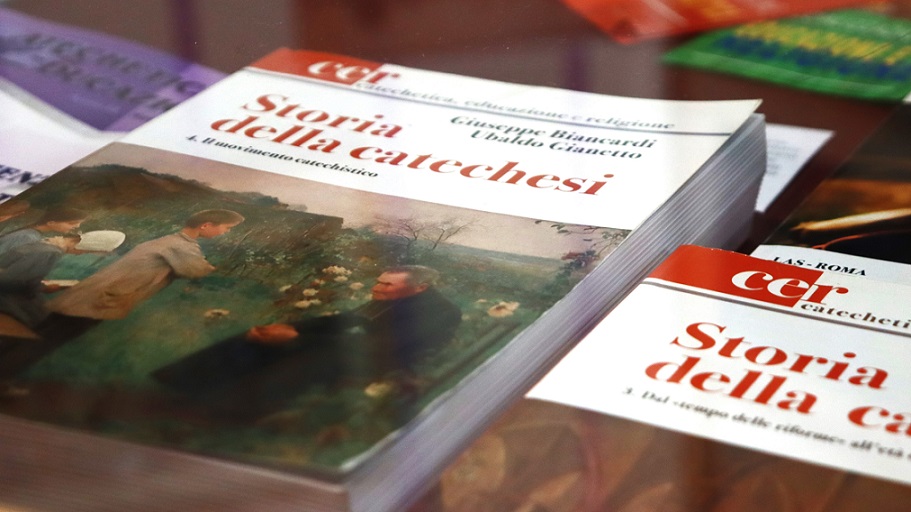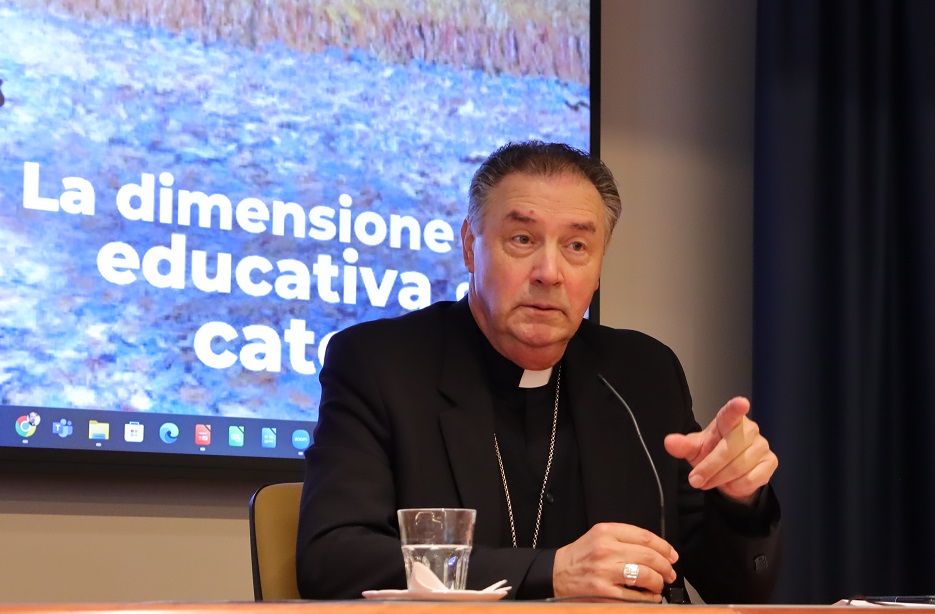Gent.ma Professoressa,
Gent.mo Professore,
Presso l’Università “Nicolaus Copernicus” – TORUN (Polonia) si terrà dal 14 al 16 settembre 2017 il V Congresso Internazionale di Scienze Religiose sul tema Religioni in dialogo tra le culture. Riforma – Dialogo – Cultura.
La sezione XIX RELIGIONI ED EDUCAZIONE AL DIALOGO di questo meeting prenderà in esame le varie realtà che il mondo attuale pone di fronte alle religioni e alla cultura: l’educazione delle nuove generazioni e i nuovi paradigmi da assumere per comprendere i rapidi cambiamenti in atto su vari fronti. La riflessione su questi temi, fatta da esperti, offrirà sicuramente stimoli per un interessante dibattito a tutti i partecipanti, provenienti dall’Europa e da altri paesi del mondo. Il confronto sarà facilitato perché è possibile dialogare in tre lingue: in inglese, italiano e polacco. Le persone interessate possono consultare la locandina e il modulo di domanda che si trova sul sito web del Congresso: www.vkongresreligii.umk.pl (pagina è fatta anche nelle lingua inglese: https://vkongresreligii.umk.pl/pages/main_page/?langu=en
Cordiali saluti,
Coordinatori della Sezione Religioni ed educazione al dialogo
Prof. nadzw. dr Mirosław Stanisław Wierzbicki
Prof. PWSZ dr hab. Elżbieta Osewska
Information/Informazioni/Informacje:
D. Mirosław Stanisław Wierzbicki SDB
Professore straordinario di Pedagogia Religiosa
Facoltà di Scienze dell’Educazione
Università Pontificia Salesiana di Roma
Piazza dell’Ateneo Salesiano 1
00139 – Roma
Tel. (+39) 06 408 87290408
Mobile (+39) 38 98 80 5612
e-mail: WIERZBICKI@unisal.it
www.rivistadipedagogiareligiosa.it
Dear Professors,
The University “Nicolaus Copernicus” of TORUN (Poland), will host the 5th International Congress of Religious Studies on the theme: Religions in Dialogue with Cultures. Reform – Dialogue – Culture. Date: from 14 to 16 September 2017.
The 19th Session of this meeting, RELIGIONS AND EDUCATION IN DIALOGUE, will examine the challenges posed to Religion and Culture by the different realities of today’s world: the education of the new generation and new paradigms to be adopted for understanding the rapid changes taking place on various fronts. The reflections that will be made by experts on these subjects will surely offer participants, from Europe and other countries of the world, the needed stimuli for an interesting debate. Discussions will be easier because you can converse in any of these three languages: English, Italian and Polish. Interested persons can see the poster and the application form in the Congress website: www.vkongresreligii.umk.pl (page is also available in English language: https://vkongresreligii.umk.pl/pages/main_page/? = en langu
Coordinators of Section Religions and Education for dialogue
Prof. nadzw. dr Mirosław Stanisław Wierzbicki
Prof. PWSZ dr hab. Elżbieta Osewska
Rome, 3 March 2017
.
Szanowna Pani Profesor,
Szanowny Panie Profesorze,
w dniach 14-16 września 2017 roku odbędzie się w Toruniu na Uniwersytecie Mikołaja Kopernika, V Międzynarodowy Kongres Religioznawczy zatytułowany Religia w dialogu kultur. Reformacja – Dialog – Kultury.
W sekcji XIX Religie a wychowanie do dialogu chcemy dyskutować na temat współczesnej wizji świata, edukacji nowych pokoleń oraz ukierunkowania myśli ludzkiej w czasie szybkich przemian kulturowych. Refleksja na wskazany tematy z pewnością przyniesie ciekawe dyskusje.
Do XIX sekcji zapraszamy prelegentów zarówno z Polski, jak również z innych krajów Europy i świata. Komunikację ułatwi nam posługiwanie się trzema językami: angielskim, włoskim i polskim.
Pragniemy serdecznie zachęcić do przyjazdu we wrześniu do Torunia oraz uczestnictwa w tym wydarzeniu. Osoby chętne prosimy o zgłaszanie swojego udziału za pomocą formularza zgłoszeniowego, znajdującego się na stronie Kongresu pod adresem: https://vkongresreligii.umk.pl/pages/main_page/?langu=en.Na stronie można również odnaleźć informacje o opłatach konferencyjnych, zakwaterowaniu, imprezach towarzyszących.
Z serdecznymi pozdrowieniami,
Koordynatorzy obrad Sekcji Religie a wychowanie do dialogu
Prof. nadzw. dr Mirosław Stanisław Wierzbicki
Prof. PWSZ dr hab. Elżbieta Osewska
Rzym, 3 marca 2017 r.
V Congresso delle Scienze Religiose
La religione nel dialogo delle culture. Riforma – Dialogo – Culture
Presentazione della Sezione XIX
XIX (Q) RELIGIONI E EDUCAZIONE AL DIALOGO
Coordinatori: D. Prof. Miroslaw Wierzbicki,
Prof. PWSZ dr hab. Elżbieta Osewska
Nell’argomento Religioni ed educazione al dialogo è ampiamente incluso il concetto della religione, dell’ecumenismo, della storia e dell’educazione. Il tema presentato si adatta bene alla percezione contemporanea del mondo e all’educazione delle nuove generazioni, come orientamento del pensiero umano. È da tempo che l’educazione e il dialogo tra culture e religioni sono considerati una base dell’esistenza umana. Le religioni sono considerate infatti un grande potenziale per lo sviluppo e l’educazione dell’uomo aprendo l’essere a problemi metafisici e culturali. Nelle religioni molti sono riferimenti all’educazione e al dialogo: diversi ricercatori sono interessati a verificare l’influenza che esse hanno sulla formazione analizzando il rapporto persona-religione in un determinato territorio. In questo modo, il dialogo religione ed educazione aprirebbe all’alterità di ogni essere umano “invitando e aiutando ad incontrare se stesso”, trovando le sue radici nella filosofia, pedagogia e psicologia, che le considerano un buon modo per cercare la verità e i valori. L’educazione al dialogo richiede una personalità matura e creativa, competente nella comunicazione e nella creazione di un clima, di fiducia, gentilezza, apertura, accettazione degli altri e la passione per l’educazione. Queste caratteristiche migliorano la capacità d’apertura dialogica tra Dio e l’uomo attraverso la sua sensibilità e curiosità cognitiva.
Si può affermare che le religioni, ancora oggi, “accendono le menti e ispirano le discussioni” sulla scena internazionale. In questo senso a religione l’uomo cerca sempre di più “l’infinito” nella sua coscienza. Per questo nelle discussioni circa la religione c’è sempre posto per le nuove opportunità che aprono al dialogo e alle domande esistenziali
ENGLISH
5th International Congress of Religious Studies
Religion in the dialogue with culture. Reformation – Dialogue – Culture
Presentation of Section XIX
XIX (Q) RELIGION AND EDUCATION FOR DIALOGUE
Coordinators: Ks. Prof. Miroslaw Wierzbicki
Prof. PWSZ dr hab. Elżbieta Osewska
The concepts of religion, ecumenism, history and education are largely included in the discussions on Religion(s) and Education for dialogue. The theme presented is well suited to the contemporary perception of the world and education of the new generations, as the orientation of human thought. It is from time immemorial that education and dialogue between cultures and religions are considered the basis of human existence. Religions are in fact considered a great potential for the development and education of man, opening him to metaphysical and cultural problems. In religions are many references to education and dialogue: numerous researchers are interested in verifying the influence they have on formation, as well as analyzing the relationship between the human person and religions in a given territory. In this way, the dialogue between religion and education would open to the otherness of every human being, “inviting and helping man to encounter himself”. It finds its roots in philosophy, pedagogy and psychology, which are considered good channels for the search for truth and values. Education to dialogue requires a mature and creative personality, competent in communication and in the creation a climate of trust, kindness, openness, acceptance of others and the passion for education. These characteristics improve the capacity of dialogical openness between God and man through his sensitivity and cognitive curiosity.
It can be affirmed that religions, even today, “light up the minds and inspire discussions” on the international scene. In this sense of religion, man is always looks for more: the “infinity” in his consciousness. For in discussions about religion, there is always room for new opportunities which open to door to dialogue and the existential questions
V Kongres Religioznawczy
Religia w dialogu kultur. Reformacja – Dialog – Kultury
Prezentacja sekcji XIX
XIX (Q) RELIGIE A WYCHOWANIE DO DIALOGU
Koordynator: Ks. Prof. Mirosław Wierzbicki
Prof. PWSZ dr hab. Elżbieta Osewska
Przedmiotem sekcji Religie a wychowanie do dialogu jest problematyka szeroko rozumianego religioznawstwa, ekumenizmu, historii i wychowania. Tematyka ta dobrze się wpisuje we współczesne postrzeganie świata, edukacji nowych pokoleń oraz ukierunkowania myśli ludzkiej w okresie szybkich przemian kulturowych i religijnych.
Od dawna wychowanie oraz dialog pomiędzy kulturami i religiami stanowił podstawę egzystencji ludzkiej. Religie wnoszą do współczesnego społeczeństwa duży potencjał w rozwoj i wychowanie człowieka, który posiada głębokie fundamenty wskazujące jednocześnie na swoistą wrażliwość, na problemy metafizyczne i kulturę. W religiach pojawia się wiele ujęć wychowania do dialogu, podczas których badacze analizują tę problematykę w powiązaniu z kształtowaniem postaw osób w relacji do religii koegzystujących na danym obszarze. W tym sensie dialog podkreśla inność każdego człowieka, a jednocześnie „zaprasza i pomaga w spotkaniu się z samym sobą”. Wskazanie na dialog ma swoje źródło w wielu rozważaniach filozoficznych, pedagogicznych czy psychologicznych, z których wynika, że był on uważany za dobry sposób poszukiwań prawdy i wartości. Wychowanie do dialogu wymaga więc dojrzałej i twórczej osobowości, odpowiednich kompetencji komunikacyjnych w tworzeniu klimatu, wzbudzaniu zaufania, życzliwości, otwartości, akceptacji drugiego człowieka oraz pasji wychowawczej. Cechy te wzmacniają zdolność dialogicznej otwartości na Boga i drugiego człowieka oraz wrażliwości i ciekawości poznawczej.
Należy podkreślić, iż religie, również dzisiaj, rozpalają umysły i wzbudzają dyskusje na arenie międzynarodowej. Człowiek dalej poszukuje nieskończoności, bo religia jest częścią świadomości ludzkiej, a nie jedynie pewnym etapem historii tej świadomości.











